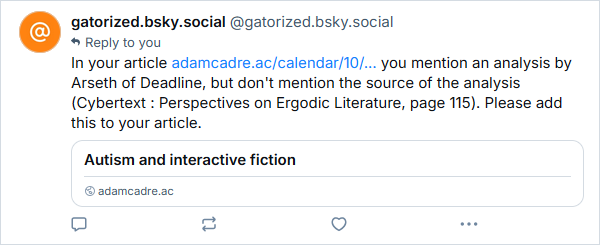
In Incident, the narrator Christopher Boone says:
|
I see everything. That is why I don't like new places. [...] But most people are lazy. They never look at everything. They do what is called glancing [...] For example, if they are in the countryside, it might be
1. I am standing in a field that is
full of grass.
But if I am standing in a field I notice
everything.
[...] And there were 31 more things in this list of things [...] And when I am in a new place, because I see everything, it is like when a computer is doing too many things at the same time and the central processor unit is blocked up and there isn't any space left to think about other things. |
It has been pointed out many times on the IF newsgroups that to completely implement a single real room would take forever. Look at the room you're in. Chances are it has thousands of objects in it. Imagine having to write a description of every single one of those objects and its relationship to every other. Eeeagh! Instead, you winnow it down to the objects you'll actually need, plus a bit of scenery. In other words, the author does for the player what the autistic person is incapable of doing for himself. No wonder there seems to be a disproportionate number of autistic-spectrum folk in IF fandom: it must be wonderful to wander around a virtual world where surroundings can be completely apprehended without being overwhelming (which isn't guaranteed even for graphical adventures).
Then throw in the fact that, yes, other characters generally don't speak unless spoken to, and when they do speak, stay on point. They don't make small talk, don't look at you expectantly, and in the very rare cases that their facial expressions are important, those expressions are translated into words. Throw in the fact that there are usually clear goals, the fact that everything operates according to a set of rules that can be deduced, and that those rules can be synthesized into a strategy for achieving those goals. So it's not just that the characters in IF appear to be autistic — it's that the medium is geared towards the preferences of the autist. Christopher Boone would love this stuff.

Twenty-one years after posting the above, I received this reply:

It is hereby added.

Return to the Calendar page!